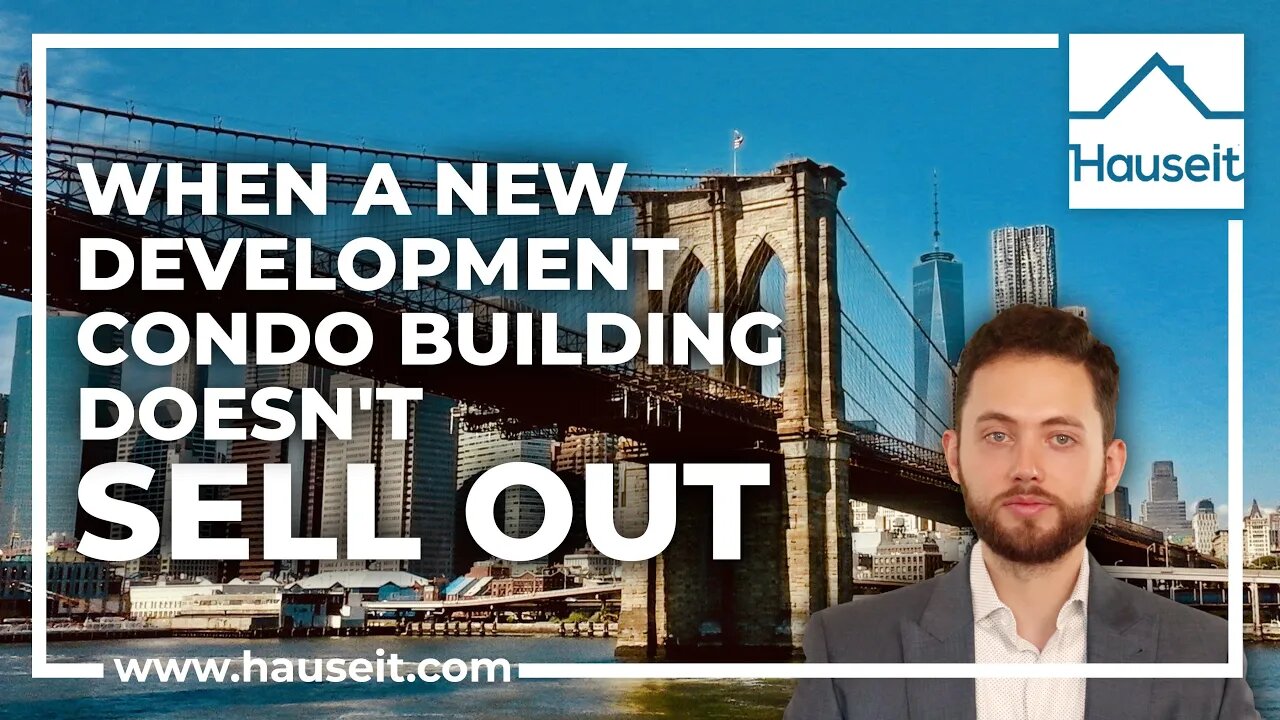Premium Only Content

What Happens if a New Development Condo Building Doesn't Sell Out?
What Happens if a New Development Condo Building Doesn't Sell Out? Full Blog Post: https://www.hauseit.com/new-condo-development-nyc-unsold/
Save 2% When Buying a Home in NYC: https://www.hauseit.com/hauseit-buyer-closing-credit-nyc/
Save 6% When Selling in NYC: https://www.hauseit.com/agent-assisted-fsbo/
I’m Nick at Hauseit. Check out our website https://www.hauseit.com to learn how to save up to 6% when selling and save up to 2% when buying here in New York City. So let’s get started!
While most new development condo buildings sell out successfully, it’s a good idea to consider what might happen if you buy into a new construction condo building in NYC which is unable to sell all of its apartments. As we’ll explain, condo buildings with a large number of unsold apartments can sometimes be a risky purchase.
If a condo building struggles with sales, the developer will typically seek to refinance the construction debt as a first step. If sales continue to slump, the sponsor may be forced to aggressively reduce prices or convert some units into rentals. A developer may also seek to offload units in a bulk transaction to an investor. In a worst case scenario, the developer defaults on the units and they’re taken over by the lender, who either sells them or possibly holds onto them until market conditions improve.
How might this impact you as the owner of an individual apartment in the building? Well, the value of your apartment will decrease if the developer cuts prices, converts to rentals or offloads units in a bulk transaction. Unsold units can also make it harder for you to sell or refinance, as lenders might not be willing to make loans to prospective purchasers in the building as a result.
In a worst case scenario, you’ll face higher common charges if the developer defaults, as the other owners including yourself will be forced to make up for the lost common charges which the developer failed to pay on the unsold apartments.
Now let’s take a step back and start with the basics of new developments. A developer, also known as a sponsor, typically finances a new development with a construction loan. Construction loans usually have three year terms with two, one-year extensions. In an ideal world, the length of the financing coincides perfectly with the complete sellout of all apartments in the building.
If a new development experiences slower than anticipated sales, the developer will need to refinance in order to push out the maturity date of the building’s loan obligations. Refinancings for new development condo buildings happen all the time, and the act of refinancing by no means a guarantee that there will be larger problems with the building in the future.
Typically, a developer who is experiencing slow sales will pay off its higher interest rate ‘construction loan’ with ‘condominium inventory loan’ which generally offers a lower interest rate, but more importantly, extends the maturity date of the development’s financing by a few years.
This lower cost, longer dated financing helps the developer to better align the realistic length of time it will take to sell the remaining units with the duration of the underlying financing. It also gives the developer more resiliency to resist making large price cuts and possibly ride out a soft market and wait to sell units into a stronger market.
If a new development continues to struggle with sales, the developer may elect to convert some of the unsold units into rental apartments. The rental income helps cover some of the carrying costs of the unsold apartments. Unfortunately, rental units can change the feel of your building due to frequent turnover, and it may also increase wear and tear on the building as a whole.
These apartments could remain as rentals for several years until market conditions improve, at which point the developer may reattempt to sell them.
In the most extreme scenario, a struggling developer with a large number of unsold apartments may stop paying common charges on those units and default on their obligations to a lender.
While the lender takes responsibility for paying unit common charges on a going forward basis, there may not be enough cash to cover the previously unpaid common charges after paying lender expenses.
In conclusion, the primary risk of buying into a new development condo building with a large number of unsold apartments is that the value of your apartment may decline. The feel of your condo building may also change if unsold apartments become rental properties. In a worst case scenario, you may also be responsible for paying higher common charges in the event of a default by the developer.
Save 2% When Buying in NYC: https://www.hauseit.com/hauseit-buyer-closing-credit-nyc/
Save 6% When Selling in NYC: https://www.hauseit.com/agent-assisted-fsbo/
.
.
Hauseit LLC, Licensed Real Estate Broker
Tel: (888) 494-8258 | https://www.hauseit.com
_
#hauseit #hauseitnyc
-
 DVR
DVR
GOP
23 hours agoDonald J. Trump Attends the Presidential Parade
308K85 -
 11:51:52
11:51:52
Right Side Broadcasting Network
7 days agoLIVE REPLAY: Inauguration of the 47th President Donald Trump, and Presidential Parade - 1/20/25
1.26M570 -
 4:25:55
4:25:55
Kimberly Guilfoyle
10 hours agoLive Inauguration Day Coverage
170K51 -
 1:06:10
1:06:10
LFA TV
1 day agoThe Return of 45 | TRUMPET DAILY 1.20.25 7pm
82.6K -
 1:50:51
1:50:51
2 MIKES LIVE
6 hours ago2 MIKES LIVE #169 Inauguration Day Special!
53.7K11 -
 1:58:10
1:58:10
Quite Frankly
10 hours ago"The Inauguration Day Call-in Show" 1/20/25
50.3K13 -
 1:13:26
1:13:26
The Big Mig™
7 hours agoTrump’s Back!
52.1K13 -
 1:06:36
1:06:36
The Rubin Report
10 hours agoNo One Expected These Brutal Moments in Trump’s Inauguration Speech with Co-Host Sage Steele
139K145 -
 8:34:54
8:34:54
Dr Disrespect
13 hours ago🔴LIVE - DR DISRESPECT - DELTA FORCE - STARFALL NEW SEASON
136K22 -
 1:58:31
1:58:31
Revenge of the Cis
9 hours agoEpisode 1432: Take Two
79.1K27